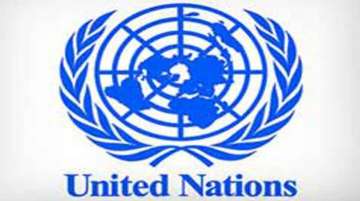UN leaders recall Gandhi's power to bring transformational change through non-violence
As the world grapples with violence in forms of environmental destruction to devastation caused by armed conflict, Mahatma Gandhi's vision of peace and sustainable development continues to resonate across the world, UN chief Antonio Guterres said on Wednesday, as leaders of the world body recalled the "transformational change" brought by a "frail" man that inspired millions around the world.

As the world grapples with violence in forms of environmental destruction to devastation caused by armed conflict, Mahatma Gandhi's vision of peace and sustainable development continues to resonate across the world, UN chief Antonio Guterres said on Wednesday, as leaders of the world body recalled the "transformational change" brought by a "frail" man that inspired millions around the world.
"This International Day of Non Violence marks the 150th birth anniversary of Mahatma Gandhi, the renowned global icon of peace. His vision continues to resonate across the world, including through the work of the UN for mutual understanding, equality, sustainable development, empowerment of young people and peaceful resolution of disputes," Guterres said in his message for the International Day of Non-Violence, observed on October 2.
Delivering the keynote address at a special commemorative event 'Climate Action: Gandhian Ways' organised by India's Permanent Mission to the UN, President of the 74th Session of the UN General Assembly Tijjani Muhammad-Bande said for the UN, almost everything that is fundamental, that the international organisation stands for, has prefigured in the work, life and thoughts of Gandhi.
"It is difficult to say anything new about Gandhi. I do not know any school child anywhere in the world, who has not been inspired by the resoluteness of Gandhi, the idea that the greatest courage is really to be non-violent. This is the utter opposite of machismo culture," that is being seen as the way forward, he said.
Muhammad-Bande said the connection between Gandhi and today's climate activism is very clear.
On climate action, he said the whole crisis the world is facing is because it produces in ways that are permanently destructive.
"The whole question of producing probably five times the food we need, and then dumping 80% of it while 815 million people are hungry," he said, adding that the inequalities in production and distribution are leading to conflicts and challenges.
"The way we produce, what we produce, how we distribute are connected to conflict, whether we like it or not," Muhammad-Bande said.
He expressed hope that the world can come together to find solutions to challenges of inequality and conflict.
"Just imagine the frail figure of Gandhi and look at the mighty battles he led. I didn't say he fought because he always was connected to people. Gandhi didn't lead alone. Gandhi lead with others. Connections are critical in bringing about social justice.
"And Gandhi led despite his frail frame. He was a very strong figure and a forgiving one...we have a lot to learn from this figure. And the world must continue to deal with non-violence, including the battle to get out of our penchant for thinking that the sharper, we make our weapons, the healthier, or safer we have. This is a fallacy," he said.
UN Secretary-General Guterres in the event said in today's turbulent times, "violence takes many forms: from the destructive impact of the climate emergency to the devastation caused by armed conflict; from the indignities of poverty to the injustice of human rights violations to the brutalising effects of hate speech".
Addressing the event, the representative of the US said Gandhi's thoughts and legacy are as relevant today, as it was seven decades ago when he led the people of India to freedom.
"Gandhiji’s message of non-violence has long resonated with the American people," she said, adding that his teachings profoundly impact US civil rights leader Martin Luther King, who was inspired by the ability of one individual to "bring about transformational change through non-violence and moral persuasion".
She underlined that Gandhi's vision of dignity and sanitation is being realized by the Swachch Bharat Mission, a "remarkable, enormous undertaking" for which Prime Minister Narendra Modi was honoured by the Bill and Melinda Gates Foundation for his leadership of the campaign.
"The Mahatma would be proud to see the great strides India has made to bring development and dignity to the 1.3 billion citizens of that country," she said.
Quoting former US president John F Kennedy, she said America is different because Gandhi lived and the world is different because of Gandhian ideas, she said.
"Gandhi's message of love, unity and tolerance is needed more than ever in a world undergoing profound political and economic change. And as fellow democracies, the US and India have a unique responsibility to uphold the values Gandhiji stood for and to ensure his messages live on for posterity," she said.
Director of Policy Studies at the Kroc Institute for International Peace Studies at the University of Notre Dame David Cortright recalled Gandhi's words of peace and unity while referring to the situation in Kashmir.
He said Gandhi had stressed that if anyone can save Kashmir, it is only the Muslims, the Kashmiri Pandits, the Rajputs and the Sikhs.
In 2007, the UNGA established the International Day of Non Violence to "disseminate the message of non-violence, including through education and public awareness" and reaffirm the desire "to secure a culture of peace, tolerance, understanding and non-violence".